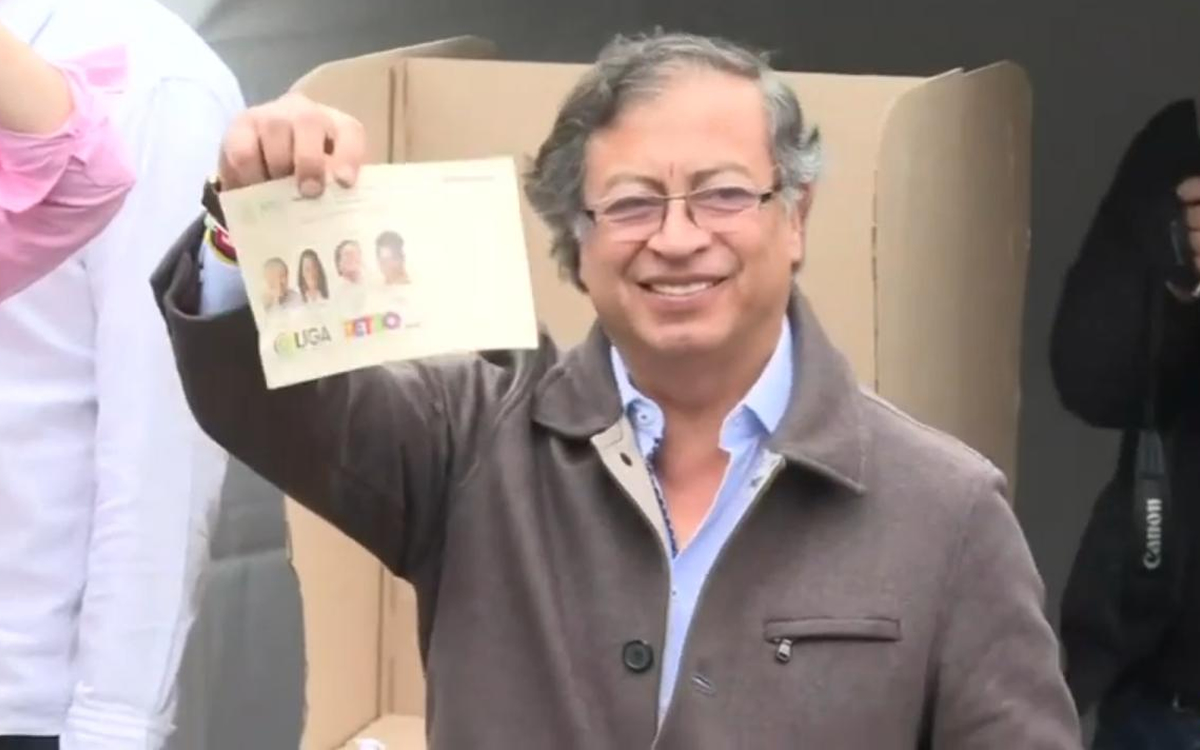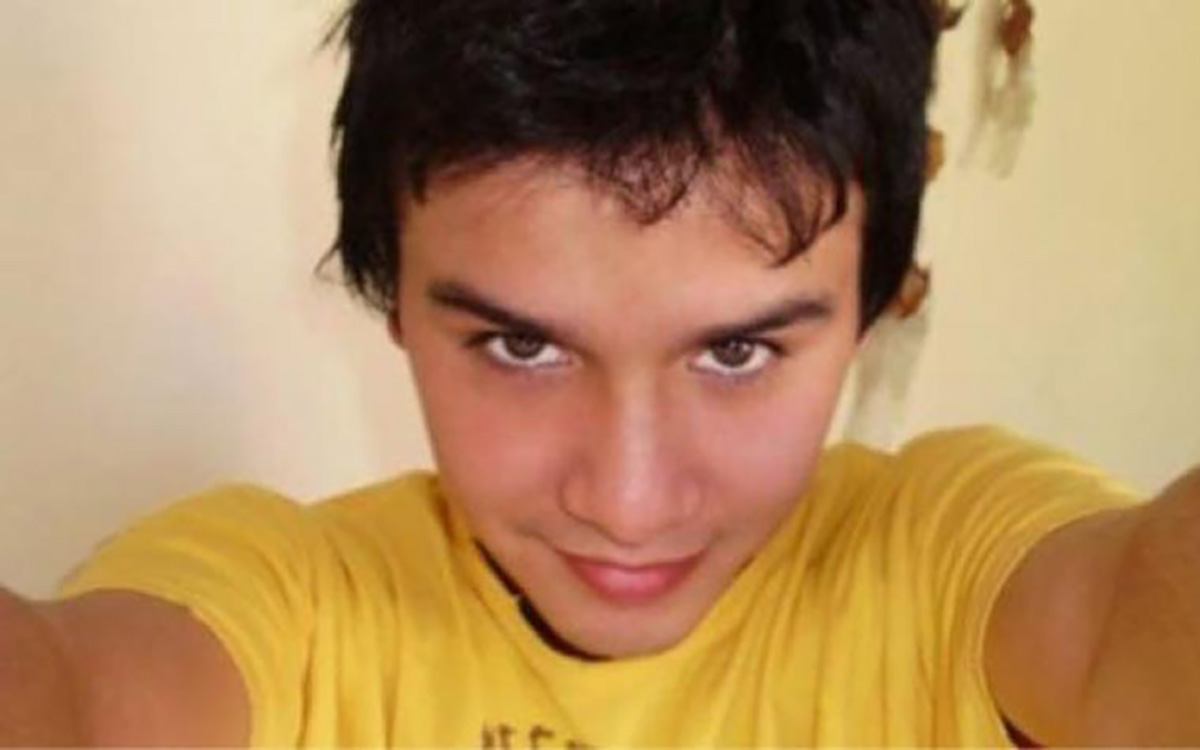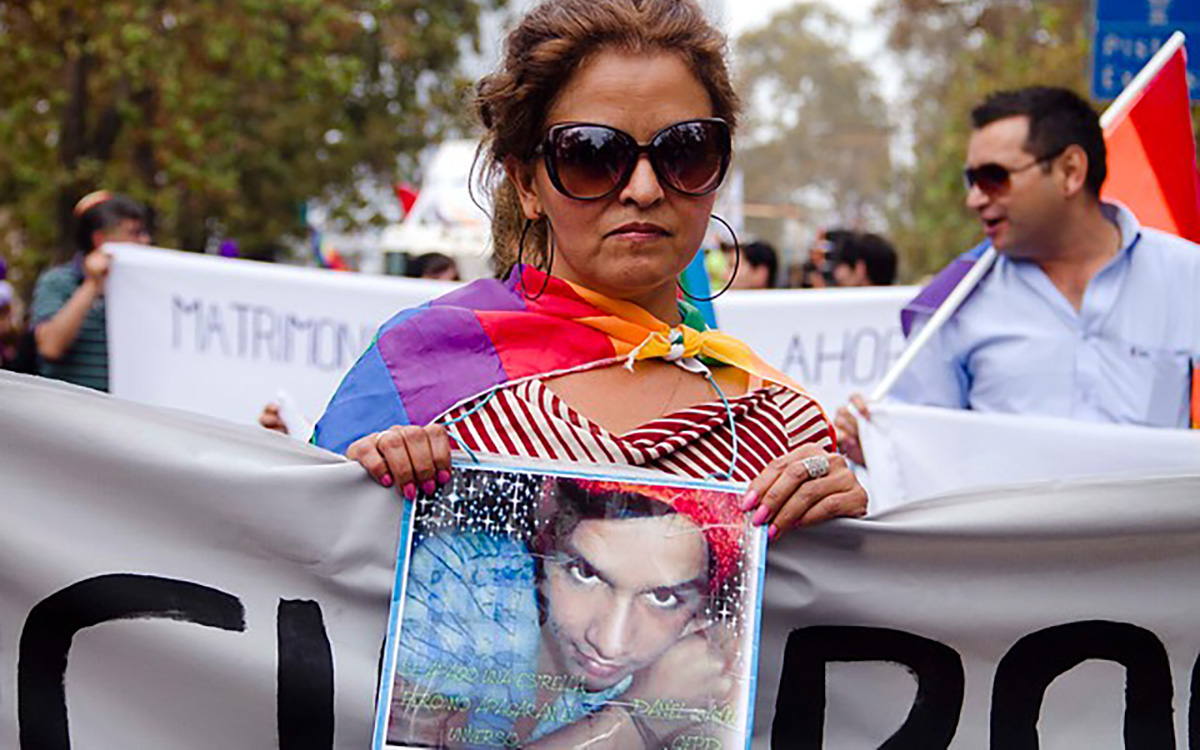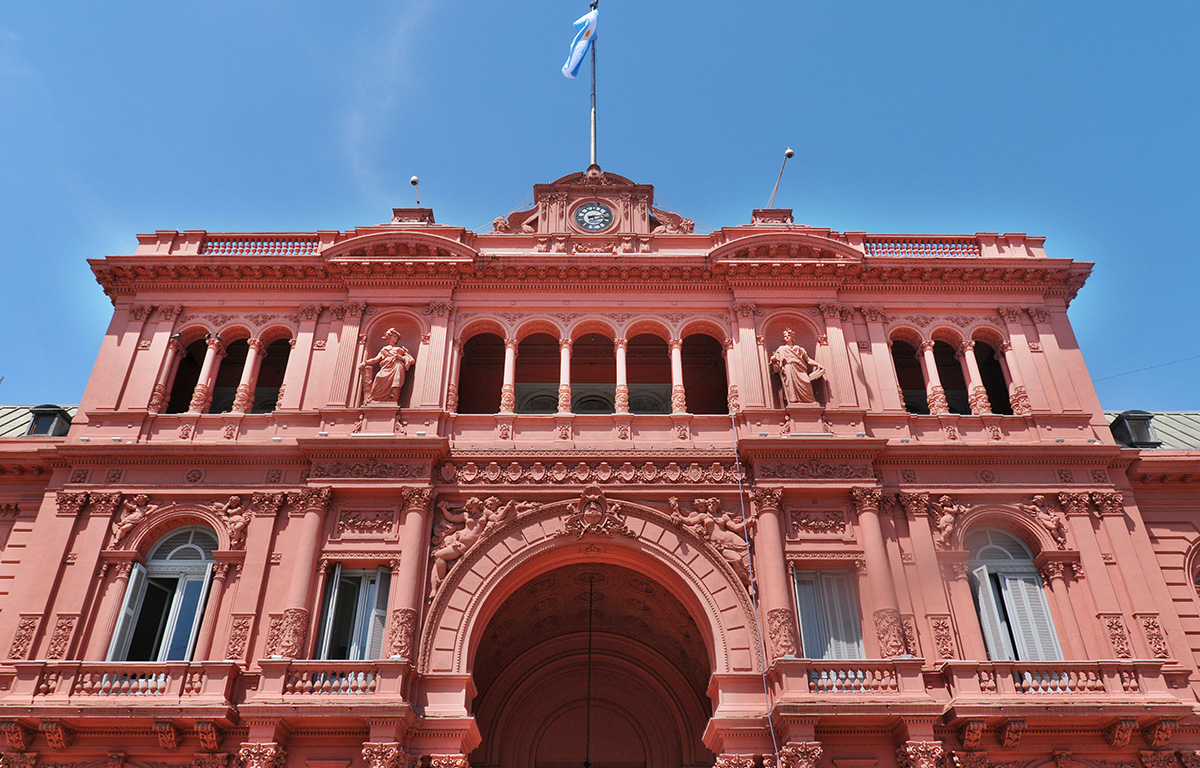South America
Former Bogotá mayor elected Colombia’s first leftist president
LGBTQ and intersex activists welcomed Gustavo Petro’s election

Former Bogotá Mayor Gustavo Petro on Sunday won the second round of Colombia’s presidential election.
Petro — a member of the Colombian Senate who was once a member of the M-19 guerrilla movement that disbanded in the 1990s — defeated former Bucaramanga Mayor Rodolfo Hernández by a 50.5-47.3 percent margin.
The former Bogotá mayor will be Colombia’s first leftist president when he takes office in August. Petro’s running mate, Francia Márquez, will be Colombia’s first female vice president of African descent.
“This is for our grandmothers and grandfathers, women, young people, LGTBIQ+ people, indigenous people, peasants, workers, victims, my Black community, those who resisted and those who are no longer with us … for all of Colombia,” tweeted Márquez after she and Petro won. “Today we are beginning to write a new history!”
Esto es por nuestras abuelas y abuelos, las mujeres, los jóvenes, las personas LGTBIQ+, los indígenas, los campesinos, los trabajadores, las víctimas, mi pueblo negro, los que resistieron y los que ya no están… Por toda Colombia. ¡Hoy empezamos a escribir una nueva historia!
— Francia Márquez Mina (@FranciaMarquezM) June 19, 2022
Petro and Hernández faced off after they didn’t win at least 50 percent of the vote in the first round of the Colombian presidential election that took place on May 29.
Petro faced criticism ahead of the election because of his previous M-19 membership and fears his government will seek closer ties to Venezuelan President Nicolás Maduro’s government, among other things.
One source in Bogotá on Sunday noted to the Washington Blade that Petro during the campaign pledged to fight violence and discrimination based on sexual orientation and gender identity and to implement policies “for the reaffirmation of gender and sexual orientation identities without barriers for all non-binary and transgender people in Colombia.” Tatiana Piñeros, a transgender woman who ran Bogotá’s social welfare and tourism office during Petro’s mayoralty that ended in 2015, welcomed the election results.
“I am very excited,” Piñeros told the Blade.
Wilson Castañeda is the director of Caribe Afirmativo, an LGBTQ and intersex rights group in northern Colombia.
Castañeda on Sunday said Petro and Márquez showed the “greatest commitment to the agenda of LGBT rights” out of the six campaigns in the election. Castañeda noted the campaign held “various meetings” with LGBTQ and intersex rights groups and pointed to the policies he implemented when he was Bogotá’s mayor.
“For the LGBT movement in Colombia, the triumph of the ‘Pacto Histórico’ campaign led by Gustavo Petro and Francia Márquez is very significant,” said Castañeda.
Angélica Lozano, a bisexual woman who became the first openly LGBTQ person elected to the Colombian Senate in 2018, and Mauricio Toro, the first out gay man elected to the country’s Congress, both praised Petro and Márquez.
“We will begin to write with all illusion a new page in the history of Colombia,” said Bogotá Mayor Claudia López, who is married to Lozano, in a tweet.
Al fin ganamos!
Felicitaciones al nuevo presidente de Colombia @petrogustavo y a la nueva vicepresidenta de todas y todos los colombianos @FranciaMarquezM!
Empezamos a escribir con toda ilusión una nueva página en la historia de Colombia!#ElCambioEsImparable! pic.twitter.com/3X9fNa0On5
— Claudia López Hernández (@ClaudiaLopez) June 19, 2022
Chilean President Gabriel Boric, Cuban President Miguel Díaz-Canel, Honduran President Xiomara Castro and U.S. Secretary of State Antony Blinken are among the world leaders who also congratulated Petro and Márquez.
“On behalf of the United States, I congratulate the people of Colombia for making their voices heard in a free and fair presidential election,” said Blinken in a statement. “We commend the many officials, public servants, and volunteers whose dedication made these elections possible.
“The United States and Colombia enjoy deep bonds between our peoples, shared values and shared interests in democracy, security, inclusive economic prosperity and human rights,” added Blinken. “Cooperation between the United States and Colombia has improved public health, livelihoods, rule of law and environmental protections in both our countries and throughout the region. We look forward to working with President-elect Petro to further strengthen the U.S.-Colombia relationship and move our nations toward a better future.”
South America
Daniel Zamudio murderer’s parole request denied
Raúl López Fuentes convicted of murdering gay man in Chilean capital in 2012

Chile’s Parole Commission on Tuesday rejected a request to allow one of the four men convicted of murdering Daniel Zamudio in 2012 to serve the remainder of his sentence outside of prison.
Raúl López Fuentes earlier this month asked the commission to release him on parole. Zamudio’s family and members of the Movement for Homosexual Integration and Liberation, a Chilean LGBTQ rights group, had gone to court to block the request.
Among the arguments put forward that influenced the commission’s decision is what Movilh categorized as his “high risk of recidivism, linked to the adherence of an antisocial behavior with a tendency to minimize his acts transgressing social norms.”
The commission pointed out that López has psychopathic traits because he is aware of the damage he did to Zamudio and his family.
“In addition, he maintains a high risk of violence, not being advisable to grant the benefit,” the report said.
Zamudio was a young Chilean man who became a symbol of the fight against homophobic violence in his country and around the world after López and three other young men with alleged ties to a neo-Nazi group beat him for several hours in Santiago’s San Borja Park on March 2, 2012. Zamudio succumbed to his injuries a few weeks later.
The attack sparked widespread outage in Chile and prompted a debate over homophobia in the country that highlighted the absence of an anti-discrimination law. Lawmakers in the months after Zamudio’s murder passed a law that bears Zamudio’s name.
López in 2013 received a 15-year prison sentence after he was convicted of killing Zamudio. Patricio Ahumada received a life sentence, while Alejandro Angulo Tapia is serving 15 years in prison. Fabían Mora Mora received a 7-year prison sentence.
Zamudio’s mother, Jacqueline Vera, exclusively told the Washington Blade after the commission rejected López’s request that “we as a family are calmer.”
“Even with my husband we were in a lot of pain at the beginning. It was like a blow of very strong emotions, so we tried to stay calm because we still had to solve the problem,” Vera said. “We had four days to solve it.”
López will have to serve the remaining three years of his sentence before his release.
“I will continue working to improve the Zamudio Law and so that this murderer does not leave prison because he is a danger to society, he does not represent repentance and people like this cannot be free,” she said. “For the same reason, we have to work so that hate crimes have life imprisonment and that is what we will concentrate on.”
South America
Man convicted of killing Daniel Zamudio in Chile seeks parole
Raúl López Fuentes in 2013 sentenced to 15 years in prison

One of the four men convicted of murdering a young gay man in the Chilean capital in 2012 is seeking parole.
Raúl López Fuentes in 2013 received a 15-year prison sentence after he was convicted of killing Daniel Zamudio.
Zamudio was a young Chilean man who became a symbol of the fight against homophobic violence in his country and around the world after López and three other young men with alleged ties to a neo-Nazi group beat him for several hours in Santiago’s San Borja Park on March 2, 2012. Zamudio succumbed to his injuries a few weeks later.
The attack sparked widespread outage in Chile and prompted a debate over homophobia in the country that highlighted the absence of an anti-discrimination law. Lawmakers in the months after Zamudio’s murder passed a law that bears Zamudio’s name.
Patricio Ahumada received a life sentence, while López and Alejandro Angulo Tapia are serving 15 years in prison. Fabían Mora Mora received a 7-year prison sentence.
López has asked the Seventh Santiago Guarantee Court to serve the last three years of his sentence on parole. Zamudio’s family and Jaime Silva, their lawyer who works with the Movement for Homosexual Integration and Liberation, oppose the request.
Movilh represented Zamudio’s family after his murder.
Zamudio’s mother, Jacqueline Vera, during an exclusive interview with the Washington Blade said López’s petition “provoked all the anguish, all the commotion of his time.”
“It was very cruel because in fact two days before we were at Daniel’s grave, where it was 12 years since his death and the beating,” said Vera. “He really does not deserve it.”
“We have gone through very difficult moments,” she added.
The mother, who later created a foundation to eradicate discrimination in Chile, was emphatic in indicating that she and her family “do not accept the release of this guy because he is a danger to society and a danger to ourselves.”
“At the last hearing where they were sentenced, they told us that we are going to remember them when they get out,” said Vera. “They threatened us with death. There is a video circulating on social networks where they were in front of me and they laughed and made fun of me. They told me that I remembered that I had three more children.”

Regarding the possibility that the Chilean justice system will allow López to serve the remaining three years of his sentence on parole, Vera said “with the benefits here in Chile, which is like a revolving door where murderers come and go, it can happen.”
“In any case, I don’t pretend, I don’t accept and I don’t want (López) to get out, I don’t want (López) to get out there,” she said. “We are fighting for him not to get out there because I don’t want him to get out there. And for me it is not like that, they have to serve the sentence as it stands.”
LGBTQ Chileans have secured additional rights since the Zamudio Law took effect. These include marriage equality and protections for transgender people. Advocacy groups, however, maintain lawmakers should improve the Zamudio Law.
“We are advocating for it to be a firmer law, with more strength and more condemnation,” said Vera.
When asked by the Washington Blade about what she would like to see improved, she indicated “the law should be for all these criminals with life imprisonment.”
South America
Argentine president announces state institutions can no longer use inclusive language
Activists condemn Javier Milei’s anti-LGBTQ policies

In a move that has generated concern and criticism throughout the country, Argentine President Javier Milei has announced government institutions can no longer use inclusive language and gender-specific references in their public policies.
This decision comes on top of other controversial measures, such as the closure of the Women, Gender and Diversity Ministry, and an announcement to shutter the country’s National Institute against Discrimination, Xenophobia and Racism.
Former Diversity Undersecretary Alba Rueda, a transgender woman who was the country’s special envoy for LGBTQ issues under former President Alberto Fernández’s government, and gay Congressman Esteban Paulón, in exclusive interviews with the Washington Blade discussed the impact of Milei’s announcement and the impact it will have on Argentine society in terms of human rights and protections for queer people.
“The State had been using the gender perspective and inclusive language to make visible the presence of women in key roles and to recognize nonbinary identities,” Rueda said. “This measure not only erases those advances, but also excludes people who are already recognized by the State in their nonbinary gender identities.”
Rueda noted Congress more than a decade ago “passed the gender identity law, which states in its first article that the State will respect the gender identity of all persons. After changes were made in the structure of the State to be able to generate identity documents, a series of court rulings that recognize nonbinary people in their nonbinary identity arose in 2016, and this (and) that remained unresolved during the Macrista government without recognizing the identity of nonbinary people.”
She pointed out Fernández’s government in 2021 issued Decree 746, which recognized “people with nonbinary identities, gender fluid and those who avoid naming their gender before the State.”
“The State already recognizes this citizenship and here comes that the prohibition of inclusive language excludes in the way of naming people who are already recognized by the State and that effectively the recognition of their gender identity is the condition of not being binary,” said Rueda. “So, the decree is in force, the law is in force, there are nonbinary people with their documents, but who today are not being named in all state documents.”
Paulón said the prohibition of inclusive language is a gesture of violence towards LGBTQ communities.
“Inclusive language has given entity and identity to an important part of the Argentine population,” he said. “This measure represents an act of harassment and violence towards those who identify with inclusive language, including the queer and LGBTQ+ collective.”
“Language is a social and cultural construction, and in Argentina today inclusive language represents and has given entity and identity to an important segment of the population and to a series of social collectives,” added Paulón. “Therefore, something that is not created by decree can hardly be eliminated by decree.”
The congressman told the Blade that Milei’s government announcement was “something that was clearly going to happen.”
“I don’t see the government campaigning in inclusive language or celebrating diversity,” said Paulón.
Milei’s decision has generated intense debate in Argentina, with critics arguing these measures represent a step backwards in the protection of human rights and an attack on diversity and inclusion. Milei’s supporters, on the other hand, defend these measures as part of an effort to promote conservative policies and reinforce national identity.
“It is very serious because it limits the exercise of citizenship and affects the nonbinary population, women and the trans population that is not recognized within the gender binarism,” said Rueda.
She noted Milei during his presidential campaign raised these issues, and has decided to implement policies that harm women and LGBTQ people.
“This is the gravity that is lived today in Argentina, that the Argentine head of state puts in confrontation and reduction of rights to women and LGBTIQ+ people,” Rueda added.
This ban on inclusive language and gender-specific policies has been announced against the context of increased political and social polarization in Argentina. With inflation at alarming levels and an economy in crisis, Milei’s government has sought to consolidate its base by adopting controversial measures that have generated division and unrest in Argentine society.
“That is the institutional and democratic gravity today in Argentina, that the head of state attacks and creates internal enemies and that position is accompanied by the media, amplifying a negative message about our communities,” Rueda said. “Of course that translates into social networks, but it also translates into the attacks that we LGBTIQ+ people experience in the public sphere.”
-

 South America3 days ago
South America3 days agoDaniel Zamudio murderer’s parole request denied
-

 Maryland4 days ago
Maryland4 days agoMontgomery County police chief discusses arrest of trans student charged with planned school shooting
-

 Politics5 days ago
Politics5 days agoCourt records raise concerns about right-wing TikTok investor’s influence
-

 Commentary4 days ago
Commentary4 days agoWorld ‘isn’t much different today’









